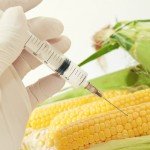New study discovers major differences between GMO and non-GMO corn
(NaturalHealth365) A 2016 study published in Scientific Reports of Nature magazine has revealed major differences between GMO corn and its natural, non-GMO counterpart. These findings call into question the safety of genetically modified organisms in terms of human health and safety both near- and long-term.
The peer-reviewed study conducted at King’s College in England used molecular profiles to assess the composition of GMO and non-GMO corn. In particular, the effects of genetic engineering to make a type of Roundup weed killer-resistant corn called “NK603” was studied.
Researchers find differences in 117 proteins and 91 metabolites of Roundup-resistant GMO corn
Tiny biochemical molecules called metabolomics as well as specific proteins called proteomics were examined. Major problems related to oxidative stress and energy utilization were detected, as well as disturbingly large increases in harmful polyamines.
The genetically modified organisms showed a marked increase in the polyamines cadaverine and putrescine, potentially toxic substances that can heighten histamine (allergic) reactions. Both compounds have also been linked with the formation of carcinogenic nitrosamines.
The researchers found clear, profound compositional differences in the GMO corn, showing that it’s not anywhere near equivalent on a molecular level to non GMO varieties. A total of 91 small molecule biochemicals (metabolites) and 117 proteins were found to be altered in the NK603 corn. These alterations were caused largely by an imbalance in energy utilization as well as oxidative stress damage within the cells.
U.S. studies of GMO crops aren’t nearly thorough enough
In the U.S., a very general assessment of molecular composition is in use by regulatory agencies assessing the safety of GMO foods and crops. If the content of nutrients is found to be in a similar range as non GMO versions, the food is dubbed “substantially equivalent.” However, studies have shown eating these foods may not be safe. Rats fed GMO corn have shown higher incidence of kidney and liver damage over two years of consumption compared with control subjects.
The 2016 British study of Roundup-resistant GMO corn went much deeper into the compositional analysis of this frankenfood than the comparatively crude tests used in the U.S. For example, GMO crops are tested for total protein content here, but the more important measure is looking at the profiles of specific types of proteins, as the British study did.
Long-term effects of genetically modified organisms on the food chain still unknown
Testing methods and technologies called “omics” allow for a far more in-depth, molecular composition profile. Assessments of protein types, gene functioning, and biochemical metabolite profiles can be taken. The result is highly detailed molecular information to help assess the safety of a crop much more accurately than just gross nutrient analysis.
The results of this study fly in the face of claims of the GMO industry and regulatory agencies. These organizations say that GMO corn is “substantially equivalent” to non GMO corn and safe to consume. Researchers are now calling for a more thorough evaluation of NK603 GMO corn and the results of consumption to health and human genetics over time.
References:
https://www.nature.com/articles/srep37855
https://enveurope.springeropen.com/articles/10.1186/s12302-014-0014-5
New Study Shows Major Molecular Differences between GMO and Non-GMO Corn
/naturalnewslinks/2017-01-06-major-molecular-differences-proven-between-gmo-frankencorn-and-non-gmo-normal-corn-serious-safety-implications-revealed-by-new-peer-reviewed-study.html
https://www.sourcewatch.org/index.php/NK603











